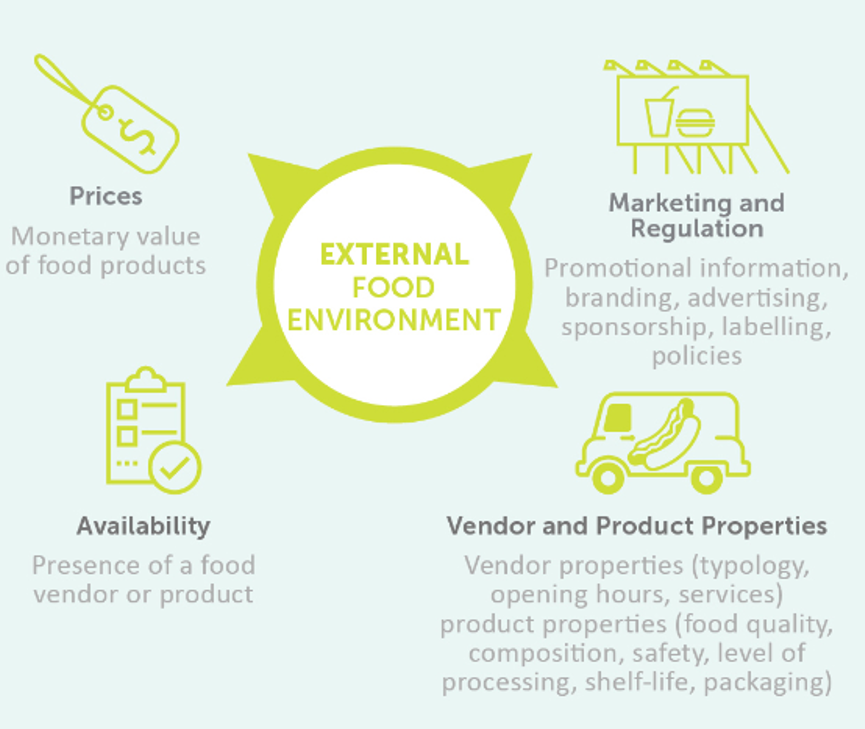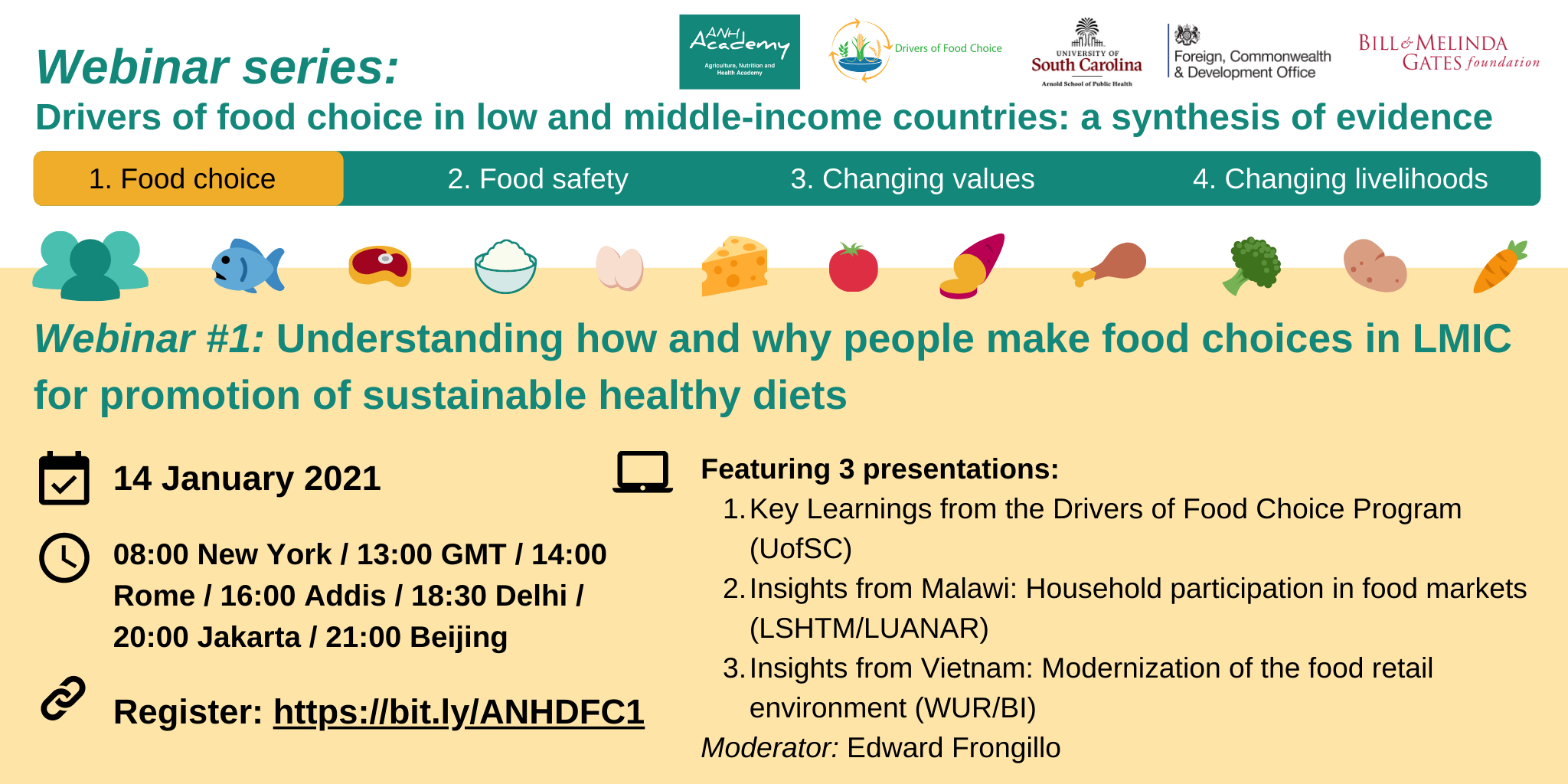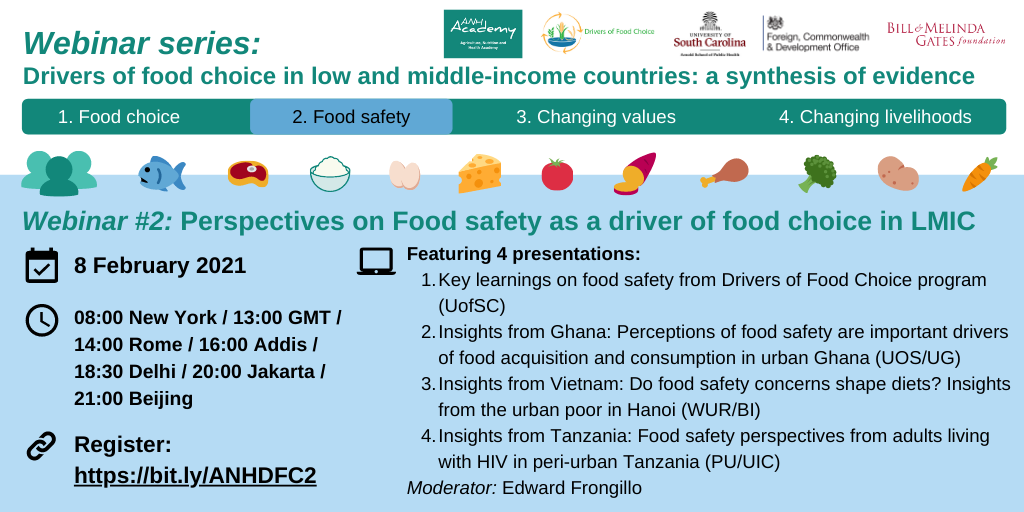
Webinar #4 in our Webinar Series on Drivers of food choice in low- and middle-income countries: a synthesis of evidence
(learn more about the series here)
Livelihoods are a means for securing the necessities of life. Rapid changes in the livelihoods of people living in LMICs have implications for all areas of life including diet. LMICs are experiencing large-scale changes in individual and household livelihoods, due in part to resource constraints, economic development and globalization, and policies directed at smallholder farmers and pastoralists. Understanding relationships between livelihood changes and food choice in LMICs is important for developing solutions to respond to emergent needs (e.g. time constraints for cooking) and mitigate the negative effects of the nutrition transition (e.g. processed food). DFC projects have yielded substantial insight into these relationships by elucidating a wide range of food choice patterns embedded within changing livelihoods. Changes have resulted from both rural-to-urban migration and situational adaptation to various socioeconomic, political, and environmental stimuli. The aim of this webinar is to provide evidence for how livelihood change in LMIC that is representative of broad global and regional trends influences food choice behaviors that have implications for promotion of sustainable healthy diets.
This webinar will include 4 presentations:
- Ligia I. Reyes, University of South Carolina: Changing livelihoods: Key learnings from Drivers of Food Choice Program
- Amy Webb Girard, Emory University: Insights from Tanzania: How sedentarization shifts diets in traditionally pastoral communities
- Amy Ickowitz, CIFOR: Insights from Indonesia: How adoption of oil palm production affects food choices in indigenous communities
- Stella Nordhagen, GAIN: Livelihoods as divers of food choice: insights from a study in artisanal gold mining areas of Guinea
Moderator: Edward Frongillo, Professor & Director, Global Health Initiatives at Arnold School of Public Health, University of South Carolina, and co-investigator for the Drivers of Food Choice Program.
Speaker profiles can be found below. Presentations will be followed by a 30-minute Q&A discussion session.
Note: To access this webinar, you will need to register and be logged in to your Zoom account. If you don't have a Zoom account, you can create one here for free.
About our Webinar Series on Drivers of food choice in low- and middle-income countries: a synthesis of evidence
(learn more about the series here)
Global food systems are altering local food environments that serve as the contexts of food choice, defined as the processes by which people consider, acquire, prepare, distribute, and consume foods and beverages. The purpose of the Drivers of Food Choice (DFC) Competitive Grants Program is to generate evidence to understand how people make food choices in local food environments, specifically what, how, and why people eat the way they do among low- and middle-income countries. The DFC program funded projects that applied multi-disciplinary perspectives and methods across highly diverse settings and populations in 10 LMICs. The webinar series will aim to disseminate important findings that have emerged from the DFC portfolio regarding drivers of individual and household food choice in changing food environments and foster discussion around next steps for scale-up and application of insights and innovations from the portfolio. The thematic areas of this webinar series articulate with prominent issues and questions currently confronting policy, practice, and research at the nexus of food environments, nutrition, and health. Webinars will showcase the critical contributions of the DFC portfolio in advancing discussions around these areas.
Resources
- Presentations:
- Amy Webb Girard: Insights from Tanzania: How sedentarization shifts diets in traditionally pastoral communities
- Stella Nordhagen: Livelihoods as divers of food choice: insights from a study in artisanal gold mining areas of Guinea
- Amy Ickowitz: Insights from Indonesia: How adoption of oil palm production affects food choices in indigenous communities
- Ligia I. Reyes: Changing livelihoods: Key learnings from Drivers of Food Choice Program
- Papers from Stella Nordhagen's team:
Join the conversation on social media
Share quotes from the speakers, reflections, screenshots and more on social media. Use these hashtags and handles on Twitter:
- #foodchoice
- Ligia Reyes: @LReyesCA
- Emory Rollins School of Public Health: @EmoryRollins @EmoryGHI
- CIFOR: @CIFOR
- Stella Nordhagen: @StellaNordhagen
- GAIN: @GAINalliance
- Drivers of Food Choice program: @DFC_Program
- ANH Academy: @ANH_Academy









